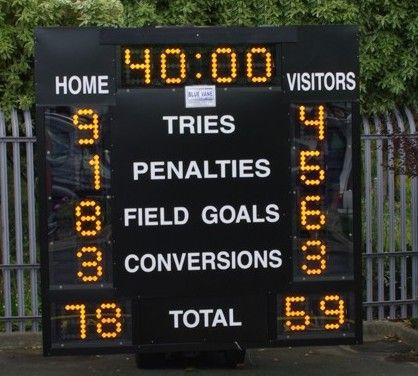Rugby can be a confusing sport when you first get into it, particularly for those who are used to the simple scoring system used in football. Hopefully, this article makes it easier to understand the scoring system in rugby union.
What is the scoring system in rugby union? In Rugby Union you score five points for a try and three points for a kicked penalty or drop goal. You are awarded two points if you kick the conversion after a try.

What are the four ways to score in rugby?
1. Try
The biggest way you can score points is by scoring a try. This happens when you ground the ball on or past the opposition’s try line. A player has to be in control of the ball and there needs to be downward pressure on the ball to consist of it being a try. They can only ground the ball with a part of their upper body.
So if a player grounds the ball with their foot this does not count as a try. Scoring a try is the target of every team as it is the easiest way to rack up the scoring in a game.
2. Penalty
When the attacking team wins a penalty they have the option of a place kick from the place they won the penalty. The attacking team wins a penalty when the defending team commits an infringement like being offside, a high tackle or going off your feet in a ruck. There are many different things a team can do to concede a penalty.
The attacking team has four options from a penalty and one of those is a place kick from where the penalty was conceded. The only time the penalty is taken in a different place is if the infringement was against a player who was kicking the ball as this would cause the penalty to be taken from where the ball landed.
If the attacking team converts the penalty by kicking it through the posts then they get three points. A lot of teams will kick a penalty if it is in the opponent’s half as it is seen as a safe way to build up points instead of going to the corner for a lineout. Penalties are very similar to conversions in that they are both a place kick which is not properly contestable. The main difference is that a penalty is worth three points.
3. Conversion
When a try is scored the team that scored it gets to attempt a conversion afterwards. If this place kick is successful then they are awarded two points. A conversion was actually how early rugby games were decided as originally a try did not get a team any points, it only gave them the chance of a conversion.
When a conversion is happening, the attacking team must stay on the try line. They are allowed to try to block the kick when the kicker begins their runup. A successful conversion is two points and it is seen as a dead ball kick because play restarts with a kickoff whether the conversion is successful or unsuccessful.
4. Drop Goal (also known as a field goal)
While the drop goal is the least common way points are scored, it is a method England rugby fans will be very familiar with. A drop goal is scored when the attacking player drops the ball onto the ground and immediately kicks it between the posts. The player has to drop the ball onto the ground and cannot kick the ball through the posts from their hands.
It is the most difficult way for players to score points as it is difficult for kickers to get into enough space for a drop goal. However, it is often used in the most crucial moments. England won the 2003 Rugby World Cup thanks to a winning drop goal in extra time and more recently, Freddie Burns kicked a winning drop goal for Leicester Tigers in the 2002 Premiership Rugby Final.
Rugby Union League points system
The way that league scoring works in rugby is very different to football as there are a different number of points for a win and there are bonus points involved.
In rugby, a win is four points and so wins are crucial in jumping up the table in rugby. There is also an incentive to win with a lot of tries. If either team scores four tries in a game then they receive an extra bonus point. This is something that the winning or losing team can receive. It means that every team is aiming to take five points from the game.
Draws are not very common in rugby but if the game ends in a tie then both teams receive two points for the draw and if it is a draw then both teams still have the chance to receive the four-try bonus point. If a team loses they do not receive any points, however the losing team can still take two points from a game.
The first would be the try bonus point. The second is known as a losing bonus point. If a team loses by seven points or fewer than they receive a losing bonus point and so losing teams can still take two points from a game if they receive both bonus points. This is the standard season but there are a few variant systems.
The French system is slightly different which means that a team who loses cannot get two points. The two bonus points in the French leagues are one bonus point for losing by less than a specific margin and one for winning while scoring at least three more tries than the opponent. It means a losing team can only get a maximum of one point from a game.
